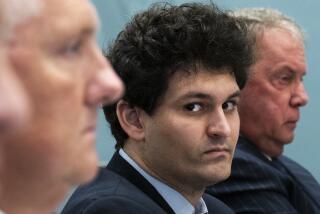Faith-Based Good Works Have a Place
- Share via
To a secular liberal, Joe Lieberman’s vice presidential candidacy makes no sense. Fundamentalist Christian, right-wing conservatives--not witty, sophisticated, post-testosteronic, liberal, Jewish Democrats--push religion on the public. Now the stale opposition of “modern” seculars and “medieval” fundamentalists has been breached. We are forced to deal with religion in new ways.
Nothing raises the problem more sharply than the current proposals for “faith-based community services,” publicly funding religious groups to do social work. To those who favor separation of church and state, this is folly. Christian fundamentalists, they fear, will use state-sponsored power to proselytize, and we’ll find ourselves on the same slippery slope that the Roman Empire took when Constantine showered state generosity on the church in the 4th century.
But like the pagans in Constantine’s day, the seculars today have a problem. Their tolerance comes more from indifference than from compassion. They have replaced the authoritarian personality with the narcissistic one.
In the nitty-gritty battle of social workers with the problems that many places in the United States now experience with drugs, violence and endemic misery, religious people who believe with passion that God wants them to treat others with love have more stamina. The more difficult the task becomes, the more prominent faith-motivated activity becomes. The question then seems less whether we let religion back into public life, but on what terms.
Here it is worthwhile to make a distinction between moral and credal eschatology. In the former worldview, people are saved by how they behave toward others; in the latter, salvation comes from what one believes. Moral eschatology--the Golden Rule--emphasizes mutual respect for other people and strengthens community solidarity. Credal eschatology emphasizes uniformity, encouraging people to pick sides, right or wrong. When moral religiousness confronts the ghastly spiritual meaning of abortions, it creates homes and environments to receive as many unwanted children as possible. Credal religiosity, on the other hand, can invoke the sanctity of life to kill abortion doctors.
How do we encourage moral religiousness without feeding credal zealotry? By encouraging inter-religious cooperation rather than silently acquiescing to denominational demands for autonomy. If people want to help people because their creed calls on them to do so, more power to them. If they hope the people they help will join their creed, fine. Nor can we stop such caring religious people from using their good works as bait in their trap of credal commitment. But they are far less likely to do so if their work necessitates cooperation with people of other faiths. Without setting such restraints on the tendency of credal zealotry to hijack good works, funding for “faith-based” community work is a recipe of civil strife.
But the greatest favor that civil society can do for religions is to deny them access to power. When the founding fathers separated church and state, they reversed a millennium and a half of Christian history in which tolerance was a “loser’s creed.” For the first time, modern Christians had made tolerance a “winner’s creed.”
These men were profoundly religious. Yet they imposed on themselves and on us, their political heirs, an exegetical modesty that works to everyone’s benefit. The great insight of secular society is not the presumptuous claim that God does not exist, but the more modest and civic one that God’s existence cannot be legislated. However literally true or false one considers Scripture (Hebrew Bible, New Testament, Koran), any belief is an interpretation. If your reading is true, let society know by the fruits of your faith, not by imposing it on the rest of us. In establishing that restraint, the founders did not want to eliminate religion but to bring out its best qualities. In so doing, they made possible a trusting community of people committed to one another rather than a domineering community that hates and fears those that it cannot turn into an image of itself.
So let the guardians of secular space make their cases and let some new voices emerge that can offer ways for civil society to engage with religious impulses. We need to learn how to make room for religious impulses without either succumbing to them or throttling them. For that to happen, both the seculars and the religious need to make major concessions, one in their grip on public discourse, the other in their hidden agendas to save all mankind by getting them to believe in the only doorway to heaven, their own. Then, perhaps, we’ll develop what the brilliant separation of church and state really calls for: tolerant passion.
More to Read
Get the L.A. Times Politics newsletter
Deeply reported insights into legislation, politics and policy from Sacramento, Washington and beyond. In your inbox twice per week.
You may occasionally receive promotional content from the Los Angeles Times.










